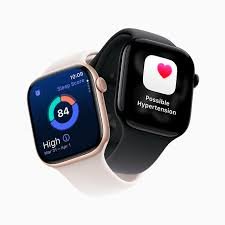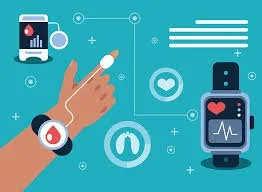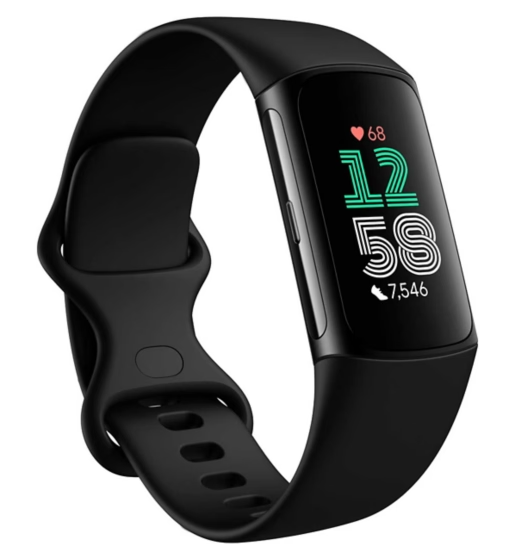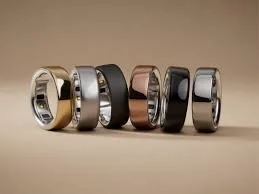AI in Healthcare & Wellness
📱 What's New This Month - September 2025
Apple Watch Series 11 Brings Blood Pressure Monitoring to Millions
Apple's September 2025 launch of the Apple Watch Series 11 introduced blood pressure monitoring to the mainstream market. This technology can alert users to possible hypertension, potentially catching health issues before they become emergencies. With 24-hour battery life and sleep score features, Apple is directly competing with specialised health wearables like Oura Ring while making advanced health monitoring accessible to UK consumers.
Why It Matters for UK Healthcare: One in four British adults has high blood pressure, but many don't know it. Continuous monitoring from a mainstream device could catch thousands of cases early, reducing strain on NHS emergency services.
Read the full story: A Foot In The Future News
Apple Watch Series 11
🏥 The Current State: AI Healthcare in the UK
NHS Digital Transformation
The UK government published the NHS 10-Year Health Plan in July 2025, with AI and digital transformation at its core. A new National Commission has been established to make the NHS the most AI-enabled healthcare system in the world, uniting clinical leaders, patient advocates and leading tech firms.
The Wearable Health Revolution
The government's shift to wearable technologies such as smartwatches aims to empower patients with better visibility to actively monitor and manage their health in real-time, both at home and in their communities. This represents a fundamental shift from reactive to preventive healthcare.
Key Trends Shaping UK Healthcare AI:
1. Predictive Health Monitoring Modern wearables don't just track - they predict. Devices can now detect potential health issues days before symptoms appear, giving users time to seek medical attention before emergencies develop.
2. Continuous Vital Sign Tracking What once required hospital equipment is now available on your wrist: continuous heart rate monitoring, blood oxygen levels, ECG capabilities, sleep analysis, and even blood pressure tracking.
3. AI Diagnostic Support AI systems are helping GPs diagnose conditions faster and more accurately, particularly in areas like radiology, dermatology, and early cancer detection.
4. Mental Health AI Apps and wearables now monitor stress levels, mood patterns, and mental wellness indicators, providing early intervention opportunities for mental health challenges.
5. Remote Patient Monitoring Chronic condition management is moving from hospital to home, with AI monitoring patient data and alerting healthcare providers to concerning changes.
🔮 Future Outlook: Where Healthcare AI is Heading
2025-2026: Mainstream Adoption
Wearable health tech becomes standard NHS recommendation
GP practices integrate wearable data into patient records
Insurance companies offer discounts for health monitoring
Predictive alerts become commonplace
2027-2028: Advanced Integration
AI diagnosis matches or exceeds human doctor accuracy in specific areas
Virtual health assistants handle routine consultations
Real-time health dashboards for chronic condition management
Personalised treatment plans generated by AI
2029-2030: Preventive Healthcare Standard
Illness prediction becomes normal part of healthcare
Hospital visits dramatically reduced for routine monitoring
AI-powered early detection significantly improves cancer survival rates
Mental health monitoring as common as physical health tracking
UK-Specific Predictions:
NHS Transformation: By 2027, expect wearable data integration with NHS records, AI triage systems reducing GP waiting times, and virtual consultations powered by diagnostic AI becoming the norm for non-emergency cases.
Consumer Adoption: Health wearables will reach 60% of UK adults by 2026, driven by falling prices, better technology, and NHS endorsement.
🇬🇧 UK Consumer Guide: What You Need to Know
Available Now (September 2025)
Best Overall Health Wearable:
Apple Watch Series 11 (£399+) - Blood pressure, ECG, blood oxygen, sleep tracking, 24-hour battery
Best for: iPhone users wanting comprehensive health monitoring
UK Availability: Apple Store, Amazon UK, major retailers
Best Value Option:
Fitbit Charge 6 (£139.99) - Heart rate, stress, sleep, exercise tracking
Best for: Budget-conscious health monitoring
UK Availability: Amazon UK, Argos, Currys
Best for Serious Athletes:
Garmin Fenix 8 (£799+) - Advanced sports metrics, health monitoring, exceptional battery life
Best for: Runners, cyclists, outdoor enthusiasts
UK Availability: Garmin UK, Amazon UK
Best for Sleep & Recovery:
Oura Ring Gen 4 (£349 + £5.99/month) - Sleep analysis, readiness scores, illness prediction
Best for: Discrete 24/7 monitoring without watch bulk
UK Availability: Oura UK website
Oura Ring Collection
Budget Health Monitor:
Amazfit Band 7 (£49.99) - Basic health tracking, long battery life
Best for: Entry-level health monitoring
UK Availability: Amazon UK
What to Avoid:
❌ Unknown Chinese brands without CE certification ❌ Devices without proper app support in the UK ❌ Wearables claiming medical-grade accuracy without regulatory approval ❌ Subscription-only devices without clear value proposition
Buying Advice for UK Consumers:
Consider Your Ecosystem:
iPhone users → Apple Watch for seamless integration
Android users → Samsung Galaxy Watch or Fitbit
Platform agnostic → Oura Ring or Garmin
Think About Your Health Priorities:
General wellness: Fitbit or Apple Watch
Heart health: Apple Watch Series 11 (blood pressure monitoring)
Sleep optimisation: Oura Ring
Athletic performance: Garmin
Chronic condition monitoring: Consult your GP for NHS-approved devices
Budget Guidelines:
Entry Level: £50-£150 (basic tracking)
Mid-Range: £150-£400 (advanced health features)
Premium: £400+ (medical-grade monitoring)
🛍️ Related Smart Tech Products
Featured from Our Product Vault:
Apple Watch Series 11 [View on Amazon UK] - The gold standard for health monitoring with new blood pressure capabilities
Oura Ring Generation 4 [View on Amazon UK] - Discrete 24/7 health tracking focused on sleep and recovery
Fitbit Charge 6 [View on Amazon UK] - Best value health tracker with Google integration
Withings Body Smart Scale [View on Amazon UK] - AI-powered smart scale for comprehensive body composition analysis
📊 Key Players & Innovations
Leading Companies in Healthcare AI:
Apple - Consumer health wearables, mainstream health monitoring Google (Fitbit) - Health tracking, AI health insights, NHS partnerships Samsung - Health monitoring, Galaxy AI health features Oura - Sleep and recovery optimization, illness prediction Garmin - Athletic health monitoring, advanced metrics Whoop - Performance optimization, recovery tracking
UK Healthcare AI Innovators:
Babylon Health - AI-powered GP consultations
Sanius - Patient wearable data integration for NHS
Kheiron Medical - AI breast cancer detection
Skin Analytics - AI dermatology diagnosis
⚠️ Important Considerations
Privacy & Data Security
Your health data is sensitive. Choose devices from reputable manufacturers with clear privacy policies. Understand where your data is stored and who can access it.
UK GDPR Compliance: Ensure any health app or device complies with UK data protection regulations.
Medical vs Wellness Devices
Know the difference:
Wellness devices (Apple Watch, Fitbit) provide insights but aren't medical devices
Medical-grade devices have regulatory approval for diagnostic purposes
Always consult your GP for medical decisions - don't self-diagnose from wearable data
NHS Integration
Some devices can share data with NHS systems. Ask your GP practice if they accept wearable data and which devices they recommend.
💡 Expert Tips for UK Users
1. Start Simple Don't overwhelm yourself with data. Pick 2-3 key metrics to track initially (e.g., sleep quality, daily steps, resting heart rate).
2. Establish Your Baseline Wear your device consistently for 2-4 weeks to establish your normal patterns before making health decisions based on the data.
3. Share with Your GP Bring long-term trends to appointments. GPs increasingly value continuous monitoring data over single-point measurements.
4. Don't Panic Over Single Readings Look for patterns over time, not individual concerning readings. Most wearables have some margin of error.
5. Battery Management For continuous health monitoring, choose devices with adequate battery life. 24+ hours is essential for proper sleep tracking.
6. Consider UK Weather Water resistance matters in Britain! Look for IP68 rating minimum for UK weather conditions.
🔗 Useful Resources
NHS Digital Health https://digital.nhs.uk - Official NHS digital health resources
UK Government AI in Healthcare https://www.gov.uk/government/news/new-commission-to-help-accelerate-nhs-use-of-ai
NICE Guidelines on Digital Health https://www.nice.org.uk - Evidence-based guidance on health technologies
This page provides general information and consumer guidance. Always consult qualified healthcare professionals for medical advice. Product recommendations may include affiliate links supporting A Foot In The Future.
COMING NEXT: AI IN BUSINESS & FINANCE




